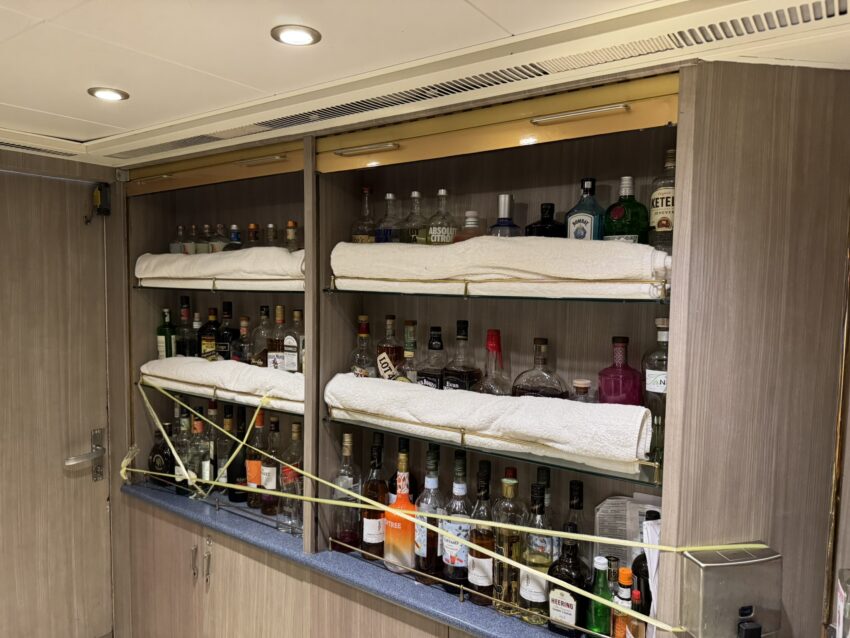(Today’s Chronicle can be found here.)
Breakfast in the room this morning. Swells were somewhere over 4 metres last night – bad enough that I was rolled side-to-side in my bed.
My wife and kids elect to take it easy this morning, but I’m eager to go and hear Philip Kendall’s Q&A regarding Tristan da Cunha:
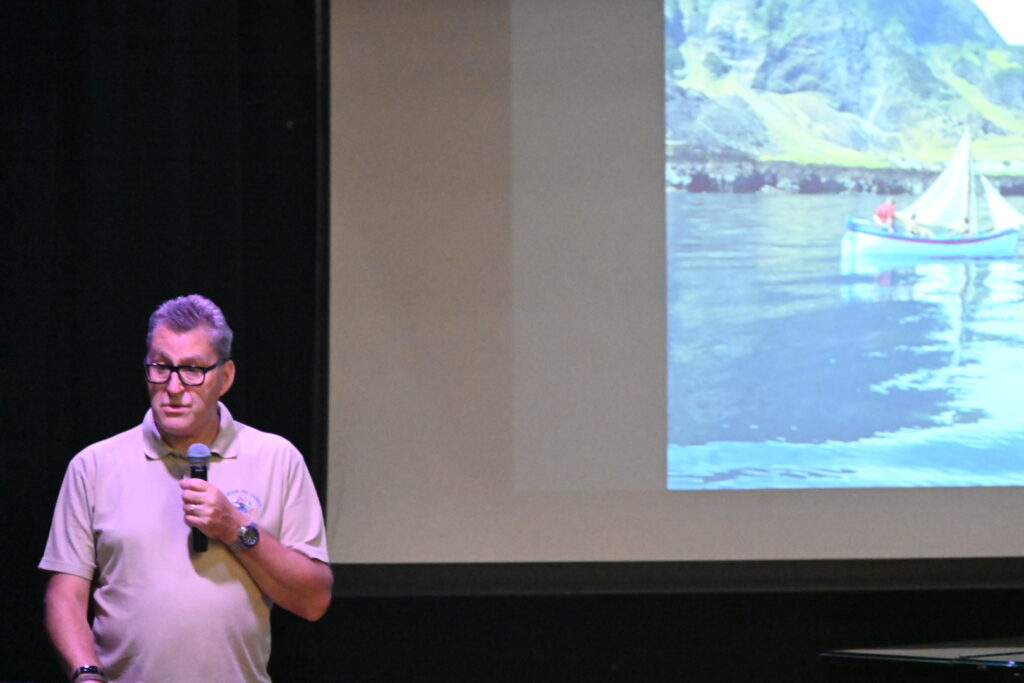
Tristan da Cunha is the most remote settlement in the world, located in the middle of the South Atlantic ocean. There are around 230 residents of Tristan, meaning that it has fewer people than the Silver Wind.
We may have missed our landing there, but we are honoured to have Tristan Administrator Philip Kendall and his wife Louise on board with us for the trip to South Africa.
How do you get to be the Administrator of Tristan da Cunha, and what do you do?
The Administrator is a UK government appointment. Philip has many decades experience in the UK Diplomatic Service. The role is mainly to ensure that Tristan has good governance and that UK tax dollars are being used efficiently.
Philip already made substantial improvements to the quality of the Internet by signing a deal with Starlink – who had initially considered Tristan a ship rather than an island – and he is working on introducing renewable power and improving the recycling situation on the island.
How is power currently provided?
Power is generated using 4 diesel generators, of which 2 are active at any given time. They are looking at adding solar power to the island. Wind is not feasible due to the number of birds on the island, and the gusty nature of the wind. They installed a turbine previously and it blew down!
Geothermal is possibly an option but it would be expensive and experts have suggested they not “poke the volcano”. (An eruption in 1961 resulted in the island’s mass evacuation, though these days it’s more likely the volcano would erupt somewhere under the ocean.)
Does the island have law enforcement?
There is one policeman – Conrad Glass – whose job is complicated by the fact that half of the residents are his family, and the remainder are his friends. He has two jail cells but has not had to use them. What little crime there is results from alcohol misuse. As both Administrator and Magistrate, Philip has had to take away three people’s driver licenses.
Someone who wants to get their license on Tristan would go for a drive with Conrad. If he thinks they’re good, then they get their license. Philip didn’t have an exact count on the number of cars on Tristan, but feels like it’s too many – everyone wants to have one, though there are only 5 km of roads.
What is the local economy like? Do residents pay taxes?
Generally wages are very low, at less than 100 British pounds per week. However, the island has a strong barter economy and foodstuffs such as beef, mutton, eggs, fish, lobster and potatoes are shared freely. Fishing is the largest source of income, followed by the foreign sale of stamps, coins and handicrafts. Tourism is also sizable, and growing.
Each family is allowed to keep a cow, and each person can have two sheep. These animals are owned individually but graze in a communal herd on communal land. People generally work two jobs – their standard job as well as assisting with fishing or farming the potato patch.
Tristan does not have a full banking system, and so theirs is a cash economy. They are able to get products from Amazon via a circuitous route but payment is difficult. This is another of Philip’s priorities.
Residents of Tristan are full citizens of the UK, though they do not qualify for UK pensions unless they have worked in the UK. The combined tax rate is 12%.
Is it possible to visit Tristan for extended periods?
Most visitors only stay briefly via cruise ship, though more are starting to come via berths on fishing or passenger ships. Passengers travel under a priority system and it’s possible to lose your berth if someone has an urgent medical need. Some Tristan residents have been waiting years for the chance to travel abroad to visit family.
Shorter visits of only a few weeks is possible but again not guaranteed due to the berth priority system. The best option for this is the Agulhas, which has 40 berths and which transports people to the South African research station on Gough Island.
Now that the internet has improved, Philip is considered attracting remote-working ‘digital nomads’ to the island – this would be a better fit with the imprecise nature of travel to and from the island.
What are the medical facilities like on the island?
A new hospital was built 7 years ago. There are two expatriate doctors – a surgeon and an anesthesiologist – who are capable of handling most simple procedures, up to and including C-sections and appendectomies. Intermediate procedures must be done in South Africa, and patients can go to the UK for treatment as needed.
Two Tristanians have trained in dentistry, and can handle most basic procedures. Once a year an expatriate dentist will stay for a full month to tackle the more complicated projects.
Does Tristan have problems with young people leaving the island?
Most young people stay on Tristan after school, which ends with the GCSE at age 16. Tristanian Owen Glass is the youngest person to make a speech to British parliament at 10 years old, and expressed his desire to grow up to be a mechanic on Tristan.
At the same time, residents of Tristan do recognize the need for limited migration. It’s generally possible to visit the island for a year before people will start to question your long-term plans. You should then be able to show your ties to the island – a job or a relationship.
You are eligible for residency after five years – and the sheep and cow-keeping rights that go along with it. But again you have to show your ties to the island, and demonstrate a willingness to contribute.
Phillip has granted permanent residency to two people but one recipient has already returned home.
Again, huge thanks to Philip for taking part in this thorough Q&A! Philip and Louise will be here for the duration of our journey to Cape Town, so please let me know if there are any other questions you’d like me to try to ask.
I take until lunch to write up to the Q&A, then head off to La Terrazza for their buffet.
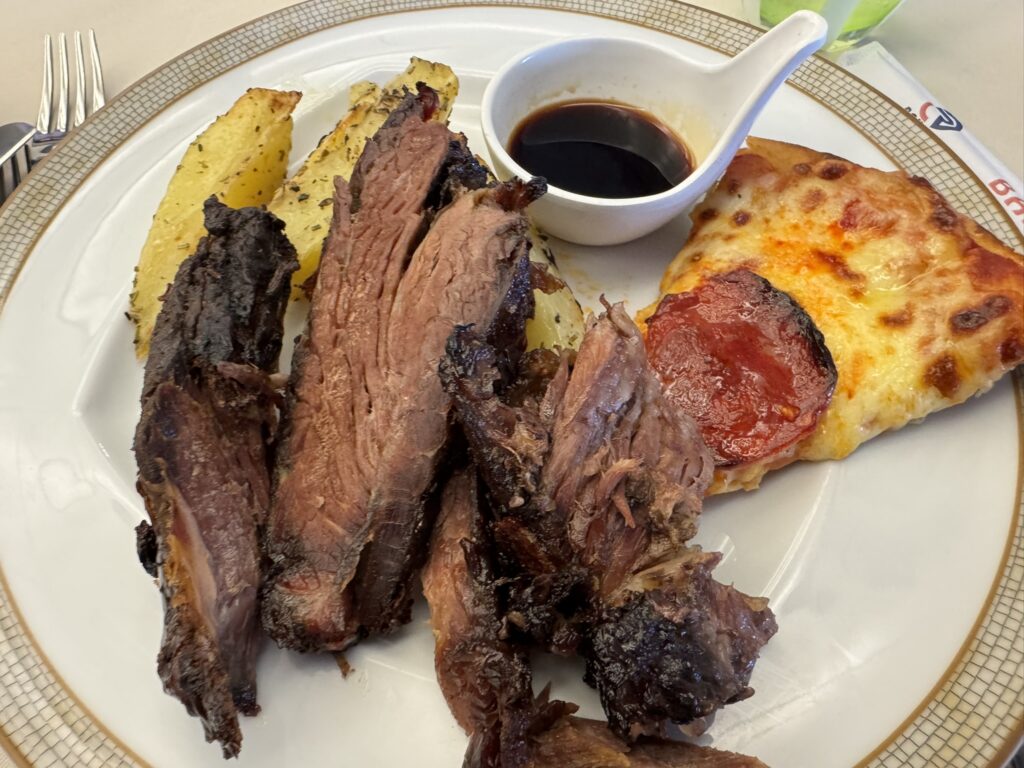
Short ribs, potatoes, pizza and sushi – a winning combination
At around noon Captain Sasha made an announcement to update us on distance travelled thus far and give us an update on the sea state. He’s expecting the swells to diminish to about 2.5 metres before eventually building up again once the storm catches up to us. We’ll take whatever reprieve we can get!
Kids and I head down to Dolce Vita for some Dungeons & Dragons – they are able to win a tough fight against the vampire spawn and return the bones of St. Andral to the church so it can be reconsecrated once more. Iryna wants to visit the church to ensure she has a safe place to go if necessary – but that’s a problem for tomorrow.
Boot return at 3 pm – just a matter of moving the boots from the mudroom to the hallway, and then having expedition staff tick our names off a list. We’ll get an e-mail later to verify our deposit has been refunded. We brought boots for our daughter as Silversea does not stock her size – the expedition staff confirmed her boots will be donated to the crew if we leave them in the mudroom.
Quick nap, then off to team trivia. We’re honoured to have the Administrator join our team today – huge thanks to Jane for inviting him! This was expedition trivia today led by Jess, and it was very difficult with plenty of questions about South Africa. We still managed to take second place, however.
Back to the room to dress for dinner, and then off to today’s briefing and recaps. Jamie confirms that they have been able to arrange for additional tours upon our arrival in Saldanha.
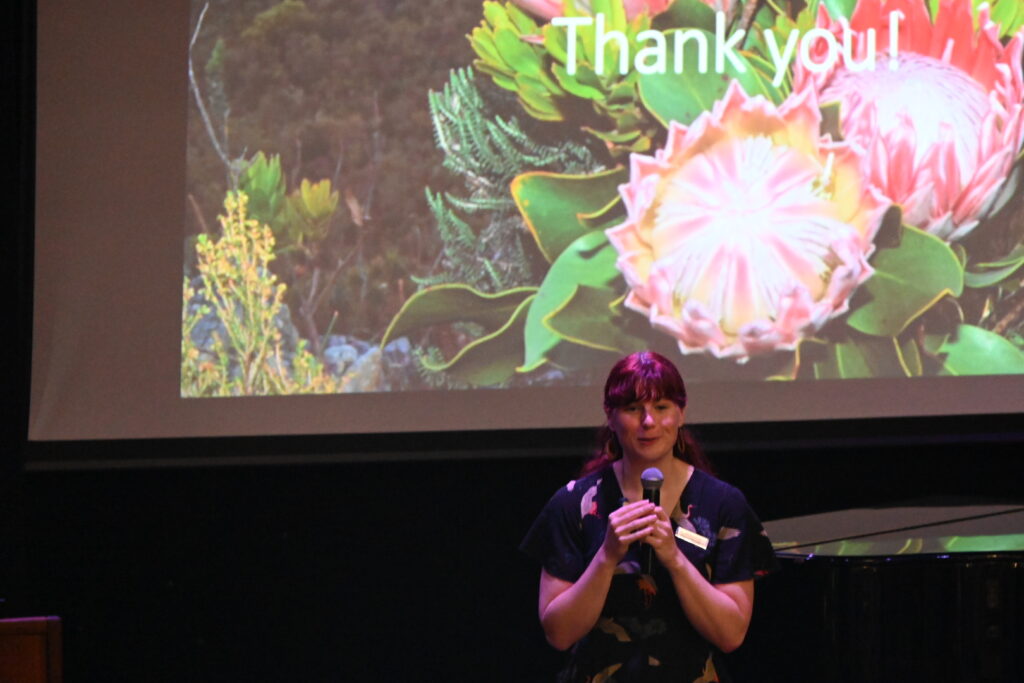
Megan presents our options, which are as follows:
Lamberts Bay History and Birdlife (with lunch) – 6.5 hours, moderate activity
Discover the rich history of Lamberts Bay, a charming West Coast fishing town, on this immersive tour. Enjoy a delicious seafood feast at Muisbosskerm Open-Air Restaurant, famous for its authentic West Coast flavors and stunning ocean views. Then, explore Bird Island, home to one of the world’s largest Cape gannet colonies, and witness these magnificent seabirds up close. Learn about the region’s fascinating maritime and cultural heritage as you take in the beauty of this coastal gem.
Wine tasting at Groote Post Wine Estate – 4.75 hours, easy activity
As you step onto the grounds of Groote Post Winery, be prepared to be enchanted by the ambiance of rolling vineyards and timeless elegance. The welcoming atmosphere is your invitation to a world of refined pleasures. Delight your palate with a curated wine tasting experience, where knowledgeable sommeliers guide you through the nuances of Groote Post’s finest vintages.
For nature enthusiasts, bird watching amidst the vineyards offers a serene escape, allowing you to connect with the beauty of the surrounding landscape. After wine tasting, enjoy a selection of delicious snacks and refreshing beverages, surrounded by the tranquility of the West Coast.
Thali Thali Game Drive – 4 hours, moderate activity
Escape to the wild and immerse yourself in the beauty of nature at Thali Thali Game Reserve, a stunning 1,460-hectare private reserve on the West Coast. Your adventure begins with a 2-hour guided game drive, where you’ll encounter a variety of wildlife, including giraffes, zebras, springboks, elands, and more. An expert guide will share fascinating insights about the reserve’s diverse flora and fauna, ensuring a memorable and educational experience. After the game drive, relax and unwind as you enjoy a selection of delicious snacks and refreshing beverages, surrounded by the tranquility of the African bush.
Exploring the West Coast Fossil Park – 3.2 hours, moderate activity
The site has exceptionally well-preserved remains of fossil fauna that date to circa 5.2 million years ago. In this period, sea levels were higher, and many now extinct animals lived in the riverine forests, wooded savanna and along the seacoast near the present day Langebaanweg site. The fossils include bones of over 200 different animal species including sabre-toothed cats, short-necked giraffes, hunting hyenas and African bears. This represents possibly the greatest diversity of five-million-year-old fossils found anywhere in the world.
We request the Thali Thali Game Drive, which thankfully does not have a minimum age requirement. Expedition guide George correctly guesses our choice as we approach the desk.
(Huge thanks to Megan for sending over these descriptions, which I have shortened slightly. Any mistakes in the editing are mine alone!)
Then on to the recaps. Martin delivered a presentation on Inaccessible Island.
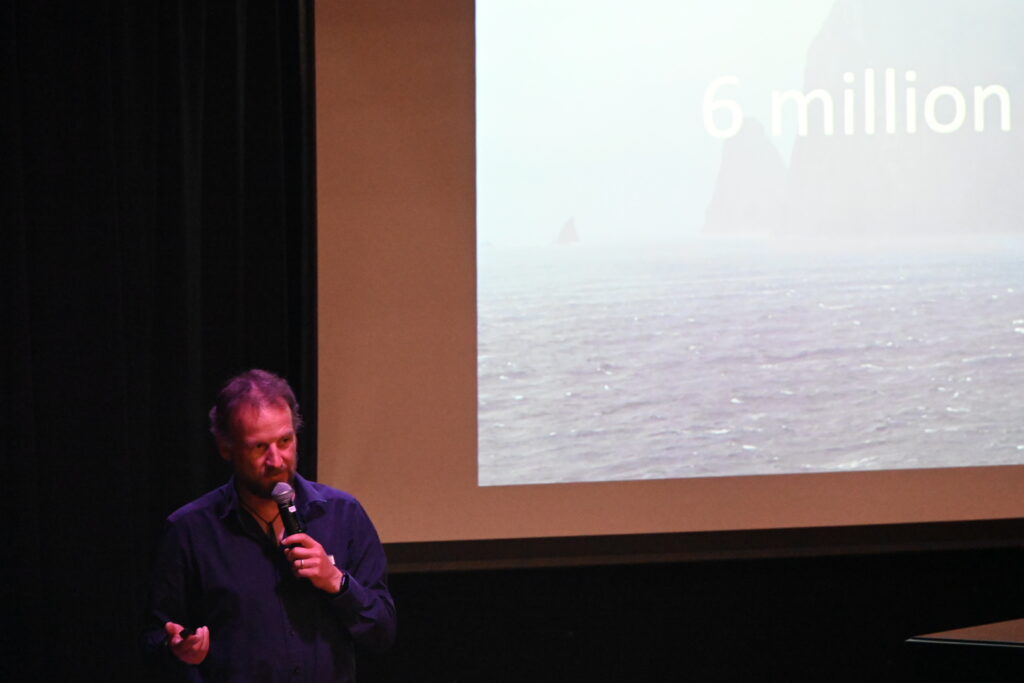
As noted already, the 6 million seabirds on Inaccessible Island alone is greater than all the seabirds in the United Kingdom. And yet this is still an incredibly fragile ecosystem – a single pregnant rat could in just 10 years utterly obliterate the birdlife on this entire island. It gives us pause as we considered human impact on the world around us, and the winnowing of pristine ecosystems such as this.
Next was Dennis, who speaks about the Tristan lobster:
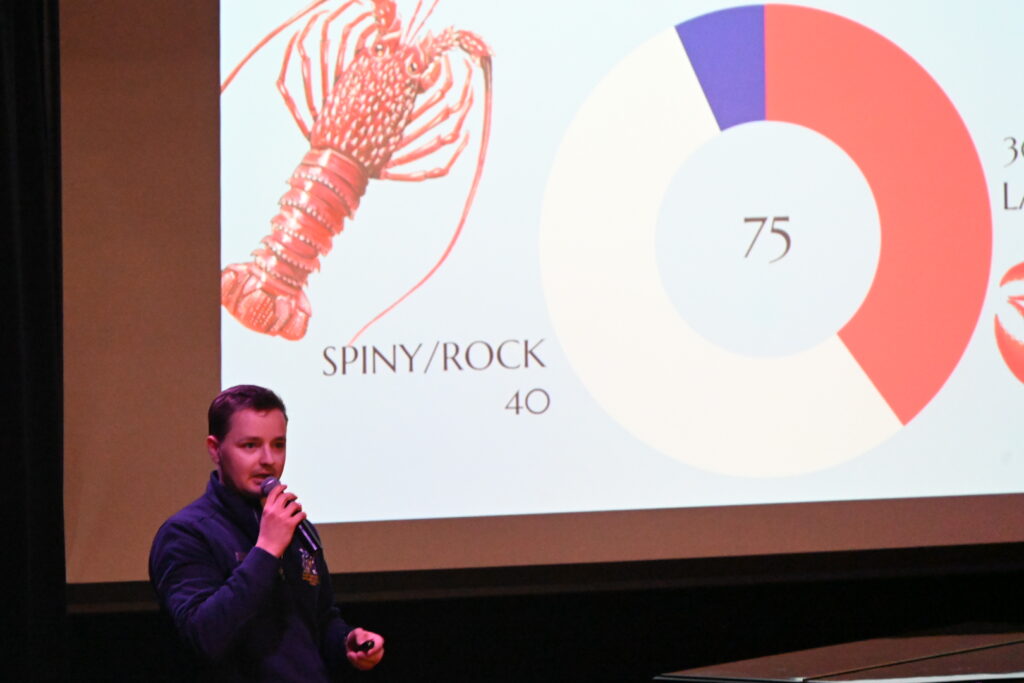
I’m surprised to learn that the Tristan lobster does not have any pincers, and that their lobster fishery is considered to be one of the most sustainable in the world.
Off for dinner, where we had the cream of potato and leek soup:
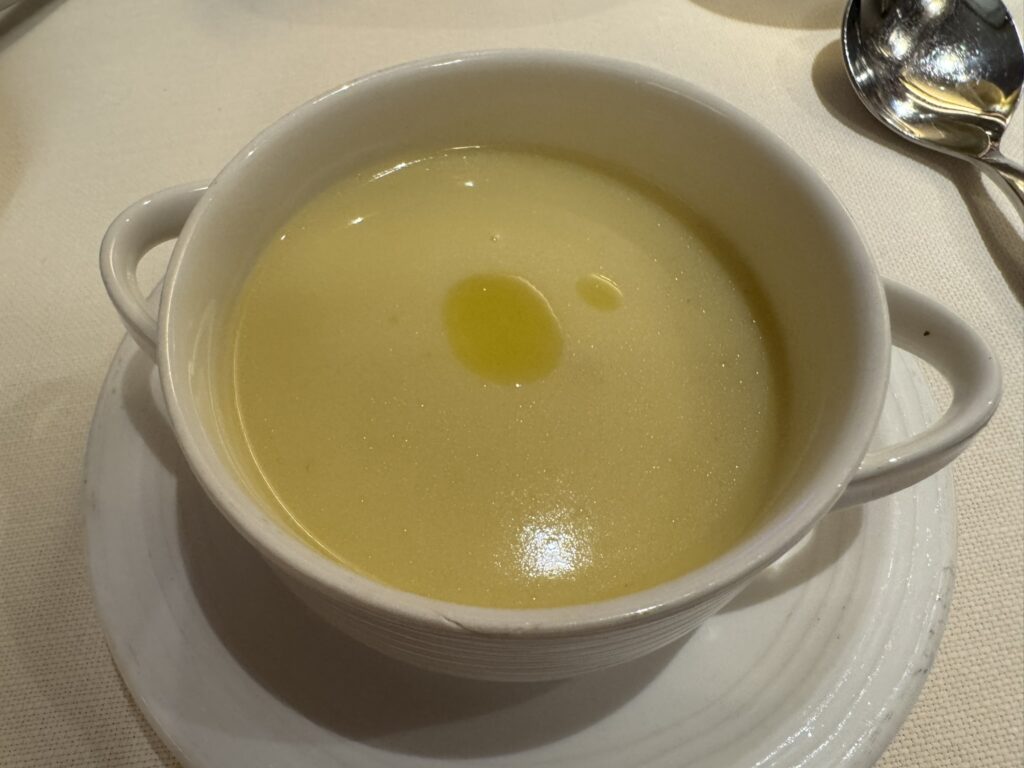
Followed by the fresh Tristan yellow tail fish:
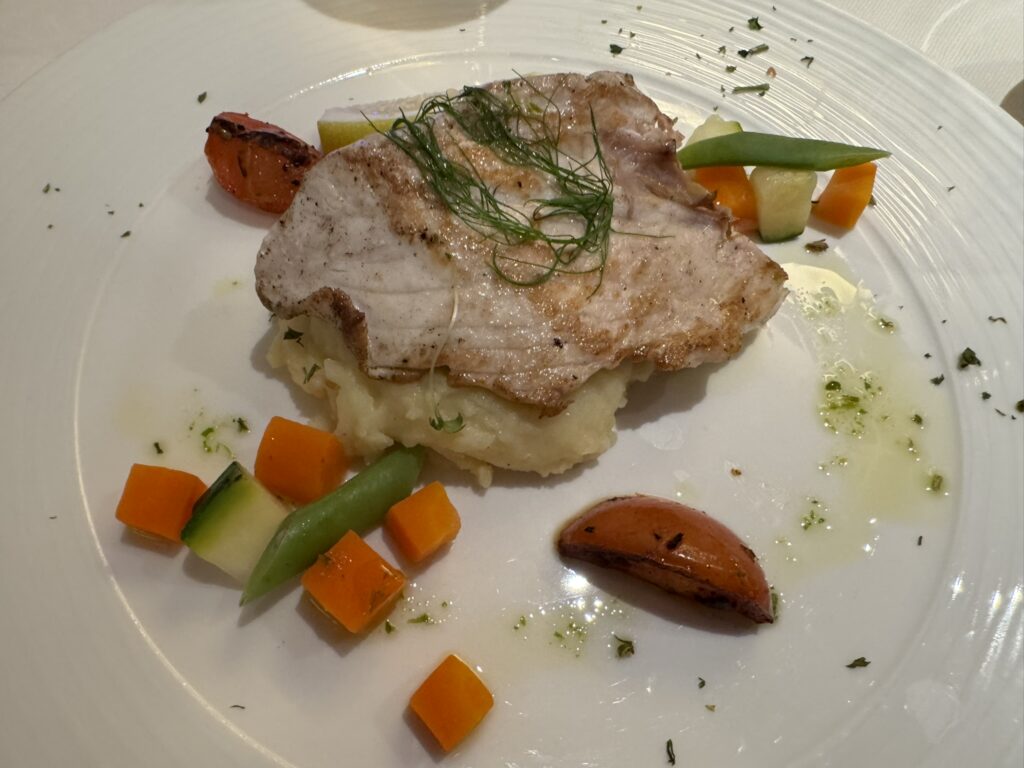
With the apple and walnut sable for dessert:
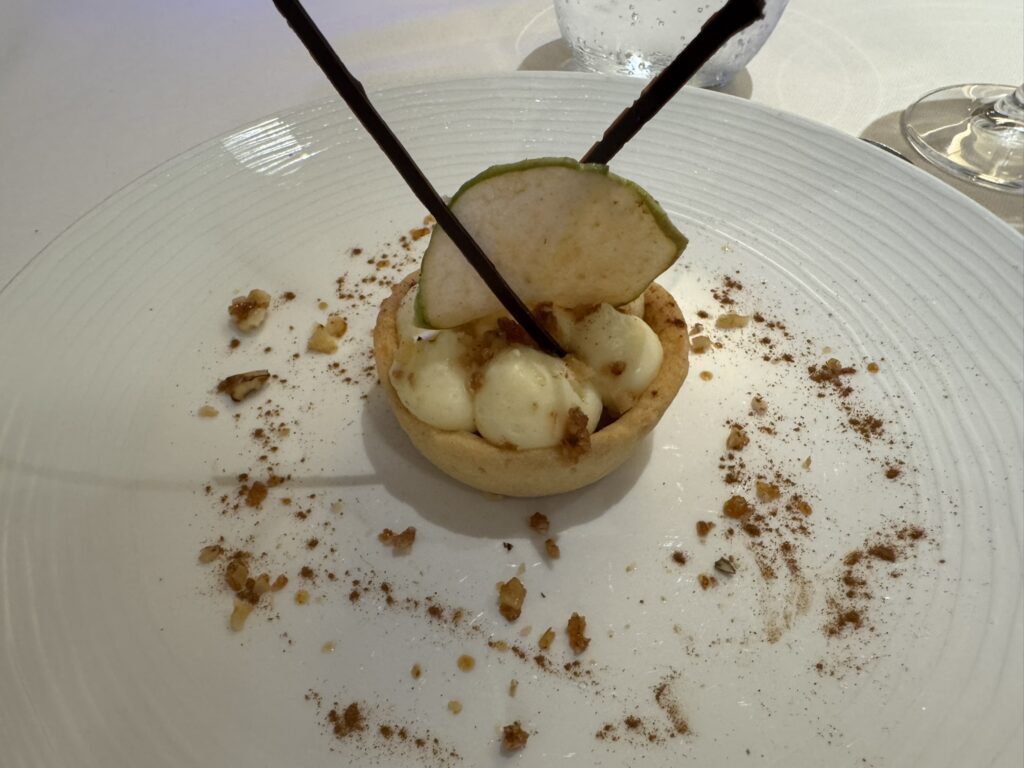
All very tasty. The Tristan yellow tail fish had a nice, light, meaty taste to it while the apple and walnut sable was one of the best desserts I’ve had thus far.
Up late tonight – despite the forthcoming time change – as my son wanted to check out bingo at 9:30 pm. There wasn’t much in the way of prizes – just keychains / bottle openers and spa coupons – but Chloë made it quite entertaining with steady witty banter and upbeat music. The rounds where we stood up until one of our numbers was called were perhaps the most entertaining. We didn’t win, but we still had a good time.
On the way down, we noticed that they had taken extra precautionary measures to protect the bottles in Panorama:
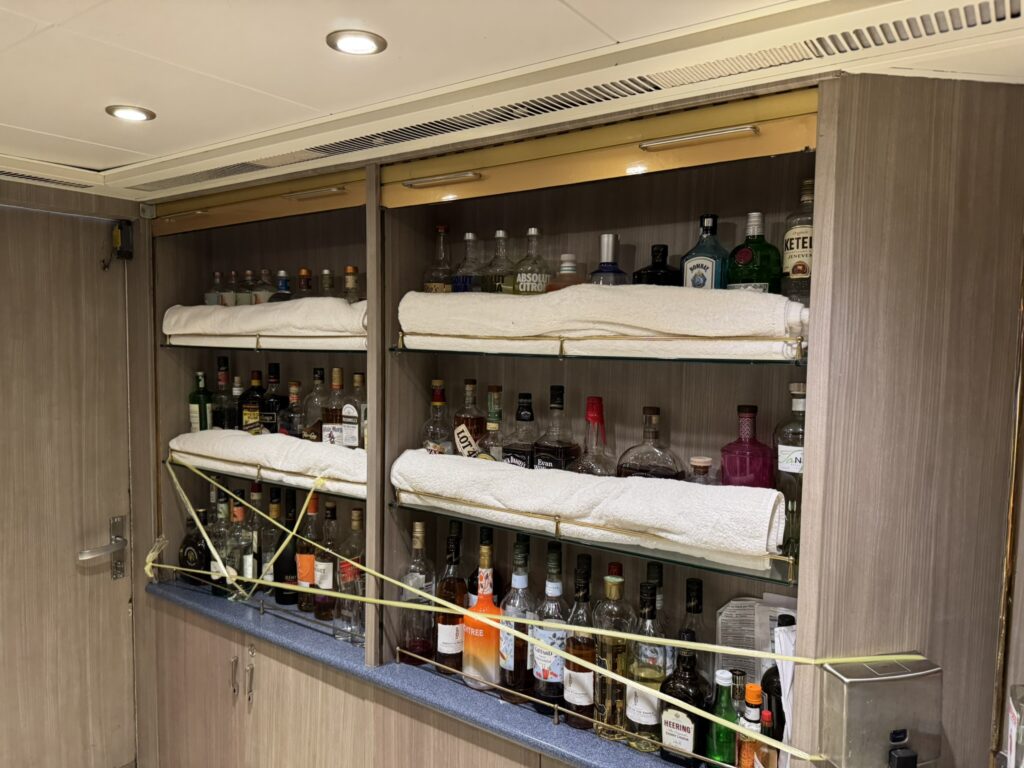
Clearly not just business as usual as far as the sea state is concerned – though we can feel it easing off as we head down the stairs.
One last stop along the way, though – I walk down the hallway to pick up a pair of Silver Spirits, our preferred nightcap, only to discover that Colin has already prepared them. He started mixing the moment he saw me coming down the hallway. If that’s not exceptional service, I don’t know what is!
